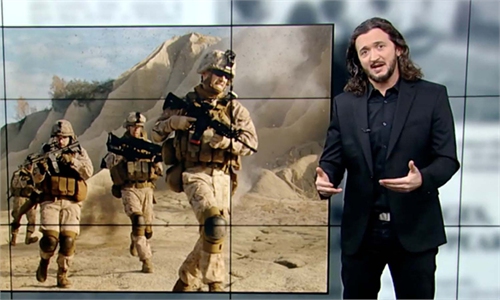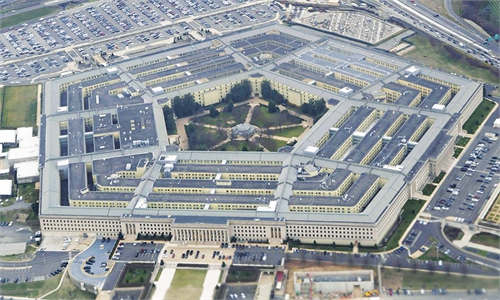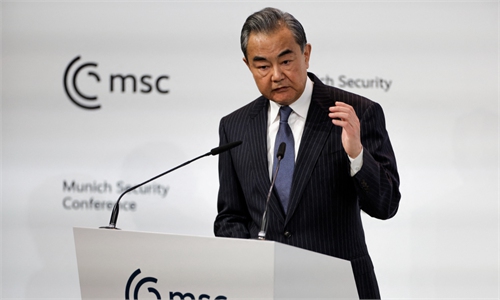GT investigates: More than 72% of respondents see US as the biggest obstacle to Ukraine peace process: GT survey
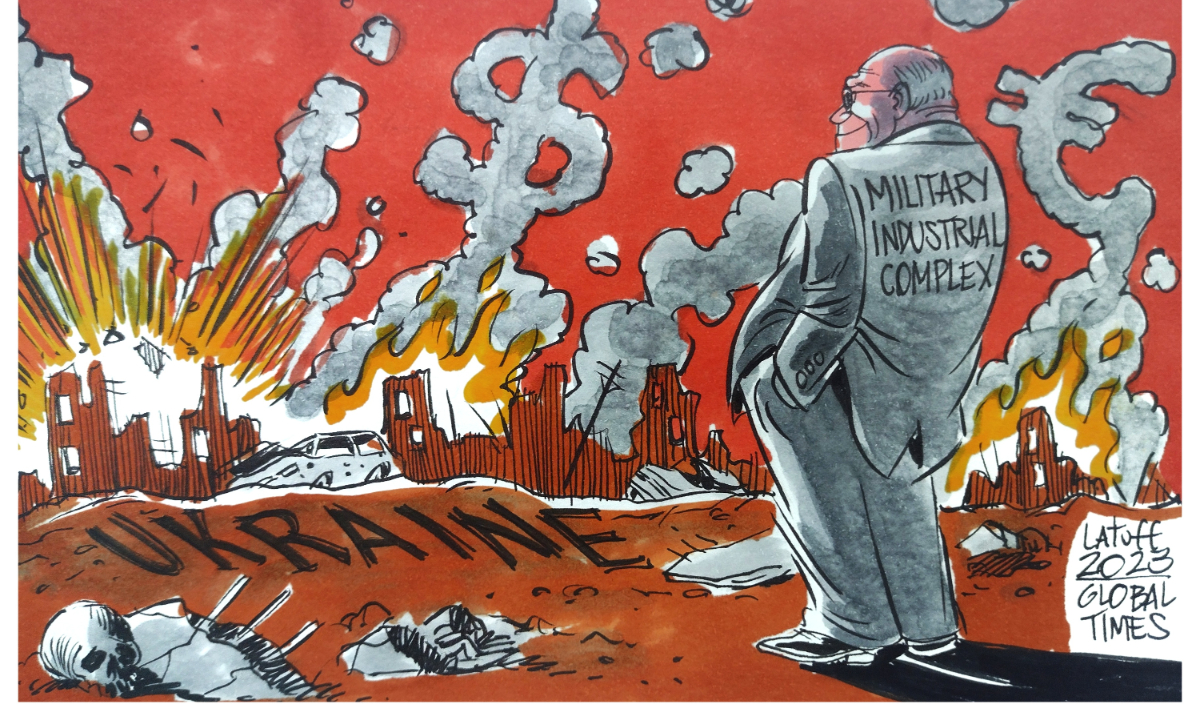
Western military-industrial complex reaps huge wealth from the Ukraine Crisis. Cartoon: Carlos Latuff
From February 17 to 20, Global Times conducted an online survey that received 5,214 response samples from Chinese netizens around the globe, with more than 68.16 percent of the participants saying the US is the one that "bears primary responsibility and should be held accountable for the outbreak of the conflict," and 39.24 percent believing that the conflict will continue for a longer term at its current intensity.
China is a country with a neutral stance and has not become directly involved in the conflict, but the other relevant parties, including Russia, Ukraine, France, Germany and the US, are all expecting China to play a bigger role to serve their demands for mediation or help them pressure their adversaries in this conflict. The opinion of Chinese society is crucial for people to understand what China can and will do for a potential peaceful settlement of the conflict in the future.
Fair and neutral stance
More than 84.8 percent of the participants found that the Russia-Ukraine conflict has had very little or no impact at all on their daily lives, 64.38 percent of them find that the biggest impact of the conflict is "arguments between people with different views on the Russia-Ukraine conflict on social media platforms or in their real lives," and 45.9 percent find the change in energy prices has impacted their living costs.
This shows that Chinese people are not like Europeans, who have been deeply impacted and concerned by the conflict in fields such as the refugee crisis, the energy and food crises, as well as the fear of escalation and potential nuclear conflict, said Li Haidong, a professor at the China Foreign Affairs University.
"This is why they [Chinese people] prefer to stay neutral and are able to be fair when observing the ongoing conflict from the perspective of an uninvolved third party," Li told the Global Times on Sunday.
US the troublemaker
When asked about how to evaluate the role that the US has played in this conflict, more than 68.16 percent of the participants said the US is the one that "bears primary responsibility and should be held accountable for the outbreak of the conflict and the ensuing damage to the global industrial and supply chains." Nearly 30 percent said although Washington did not actually start the conflict, the US has successfully used the conflict to maximize its own strategic interest, as it has seriously undermined Russia and the EU and brought a negative impact to the world economy and international security.
Some participants told the Global Times that they believe it was the US that has provoked the conflict, because Russia had repeatedly warned the West about NATO expansion, but the US just ignored the warnings, and even encouraged Kiev to challenge Moscow's bottom line on purpose by undermining the implementation of the Minsk agreement, leaving Russia with no choice but to take military measures to respond to the threat from the West.
They sympathize with the Ukrainian people but believe that Kiev has been used by Washington as a proxy to fight Moscow for as long as possible, which is why Russia and Ukraine have failed to implement their agreements reached in a series of peace talks in 2022, said some participants of the survey.
The Biden administration has benefited from the conflict in various ways, such as maintaining internal bipartisan unity on this issue amid intensifying partisan struggles, allowing the military-industrial complex to earn huge amounts of profits through expensive arm supplies to Ukraine, and worsening the business environment in Europe so as to force European companies to move their industries from Europe to the US. These are some of the reasons why many netizens believe the US has played a destructive rather than constructive role in the conflict.
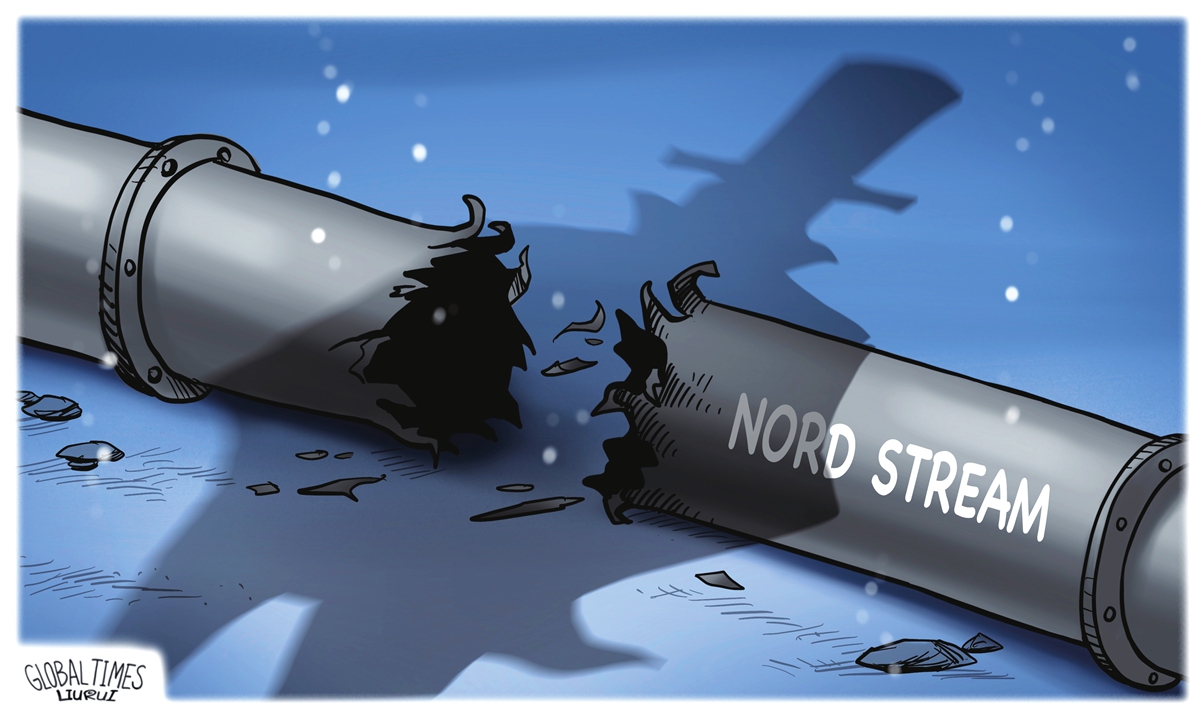
US the culprit. Illustration: Liu Rui/GT
The latest report by Pulitzer Prize-winning American journalist Seymour Hersh said the US Navy destroyed the Nord Stream pipeline under the Baltic Sea last September, cutting Russian gas supplies to Europe. The suspicious attitude shown by the US and other Western countries to the report made more Chinese people believe that the US is the troublemaker that will do everything it can to disrupt any possibility of peace based on independent and pragmatic decision-making between the major EU countries and Russia.
Experts said China is facing a similar threat from the US in Asia to what Russia has seen in Europe in past decades. Based on facts such as the formation of the AUKUS alliance and the Quad mechanism, they believe Washington is trying to replicate bloc-to-bloc confrontation in Asia by forming and strengthening its alliance to contain China. The US has also ignored China's warnings against challenging its core interests like the Taiwan question again and again by continuing arms sales and sending senior officials to encourage secessionist forces on the Taiwan island.
Additionally, the Chinese people have seen many cases of the US trying to undermine China's relations with other regional countries and create conditions to further worsen regional security in the Asian-Pacific region, so it's very natural for Chinese people to understand Russia's situation in Europe, experts noted.
Over 72 percent of participants said "the US involvement makes Kiev unable to make decisions independently, and the Nord Stream pipeline explosions have cut off ties between Russia and major EU countries, and the US and NATO want to draw out the conflict."
On this matter, the survey shows that the Chinese people and the government share the same judgment. Wang Yi, director of the Office of the Foreign Affairs Commission of the Communist Party of China Central Committee, said at the Munich Security Conference on Saturday, "Despite multiple rounds of negotiations between Russia and Ukraine last year, the peace talks ended without any result."
We are not aware of the reasons behind it. It seems some forces might not wish to see successful peace talks or an end to the conflict, Wang said.
Those forces "do not care about the lives of the Ukrainian people, nor the damage taken by Europe," Wang said, adding that they have a larger strategic goal.
Wang didn't name who the "forces" are, but analysts said the answer is clear: The key to ending the conflict is in the hands of Washington.
Long-term conflict
The survey showed that 39.24 percent of the respondents believe that the conflict will continue for the long term at its current intensity, and 37.17 percent believe that some negotiations will take place when both sides get tired and can no longer afford the long-term conflict, but small conflicts will remain and negotiations won't bring peace immediately.
Over 17 percent of participants believe that "Russia will win the war eventually and its strategic goals will be realized, and the security landscape of Europe will be profoundly changed," and 4.51 percent believe NATO will eventually get involved directly, and Europe will face "the danger of another World War." About 0.9 percent believe Ukraine could win the war, and only 0.8 percent believe Russia's nuclear weapons will be used in Ukraine if Russian troops are defeated by Ukrainian forces.
Although more people believe Russia has the clear advantage, 52.71 percent said that after 12 months of conflict, Russia's status as a "major world military power" is wavering, and the military performance of Russian forces in the battlefield has been somewhat "disappointing." Over 23 percent of them said the war has reflected Russia's real military capability, while 18.58 percent said "Russian forces are still powerful, but just made some mistakes in strategic judgment and intelligence at the very beginning."

